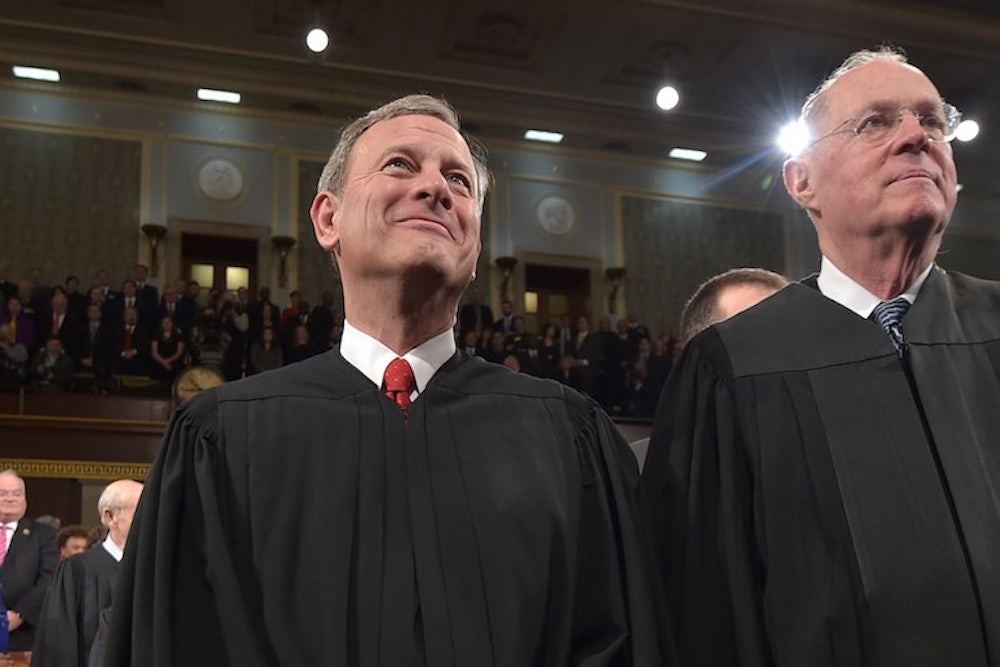When conservatives gathered at the American Enterprise Institute in late 2010 to devise legal strategies for destroying the Affordable Care Act, they found a weapon in the phrase “Exchange established by the State.”
These five words will be at issue on Wednesday in King v. Burwell, the Supreme Court case that will determine whether Obamacare subsidies continue flowing to citizens in 34 states that didn’t set up exchanges. But back then, the same lawyers who now support the King petitioners’ quest to eliminate those subsidies saw things differently. The power of the phrase as a device to undermine the ACA didn’t stem directly from the fact that subsidies might not be available everywhere, but from the idea that leveling such an immense threat at reluctant states and their citizens might be unconstitutionally coercive. One King architect, Case Western law professor Jonathan Adler, even argued, “Here…it is state citizens who lose a financial benefit if their state does not act. This structure could create potential coercion concerns.”
Four years ago, they hoped to use the phrase to persuade five conservative justices—and Justice Anthony Kennedy in particular—to throw out the whole law. Today, they want those same five justices to reanimate those "coercion concerns" and impose them on unwitting states.
By their own lights, though, Kennedy should be reluctant to treat states with such callous disregard. So to set his mind at ease, these Obamacare foes have recruited six conservative states to claim they refused to set up exchanges with eyes wide open, knowing full well that their constituents would be ineligible for valuable tax credits, and that the federal government would impose an unworkable regulatory scheme upon them, as a result.
“Amici States have predicated decisions regarding establishment of Exchanges on the implementation of the ACA and its incentives as Congress wrote them,” the brief reads, “only to have those expectations unsettled by an interpretation of that law that cannot be squared with the plain text of the statute.”
If several states weren’t actually coerced, how could the scheme be unconstitutionally coercive?
In truth, these state officials learned of the supposed threat not from the federal government, or their own reading of the statute, but from anti-Obamacare activists themselves. The Cato Institute's Michael Cannon—a leading King architect—traveled the country telling states about the unexploded ordnance buried in Obamacare. But in several instances the claim that states predicated their decisions on the subsidy "incentive" appears to be completely false.
“When the state opted to join the federal exchange, the decision was made based on the understanding that credits would be available,” Shayna Varner, a spokeswoman for West Virginia’s Democratic governor Earl Ray Tomblin, told the Charleston Gazette last week. “Governor Tomblin was not consulted before the attorney general filed his amicus brief, and the brief does not reflect the state’s understanding of the law when the decision to join the federal exchange was initially made.”
Tomblin has contemporaneous notes to back him up.
Similar evidence suggests that officials in South Carolina, another signatory to the brief, didn’t know about the condition on the subsidies. The Washington Post’s Greg Sargent has likewise spoken to officials in Republican-controlled states that didn’t join the brief, all of whom attested to the same thing: the subsidies were presumed to be an unconditional feature of the law. After an extensive review Georgetown University’s Center on Health Insurance Reforms concluded that tax credit availability didn’t drive decision-making in any of these states.
“Taking a closer look back at the statements and reports we compiled from the amici states specifically, it is not evident that this line of reasoning played a significant role, if any, in most of their decisions to opt out of operating state-based exchanges.”
That states were unaware of any conditions on ACA subsidies when they decided whether or not to participate complements the federalist argument that the architects of the challenge once made themselves. Not only is the threat coercive—it's also invisible.
Speaking to the Wall Street Journal, Stanford University law professor Michael McConnell—a conservative whom George W. Bush appointed to the 10th Circuit Court of Appeals—said “the consequences for the people of the state are very high,” suggesting that “there’s pressure being brought on the exercise of a constitutional right.”
For Kennedy—and John Roberts as well—that’s a highly animating concern. It's also one of many good reasons to uphold the subsidies.
